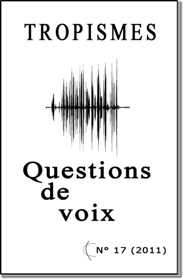“A Universal Hubbub Wild of Stunning Sounds and Voices all Confused”
Mots-clés :
Milton, John, Agamben, Giorgio, Voix, Enfance, Sémiotique, SémantiqueRésumé
In Infancy and History, Giorgio Agamben describes infancy as a leap across the divide which seperates phōnē from logos, or voice from discourse. Language is made possible by this very division, a fracture that man himself introduces as he emerges from infancy to become the speaking subject. Infancy thus represents the original dimension of humanity. A similar conception of infancy lies at the heart of John Milton’s Paradise Lost. But where Agamben theorizes on the origins of language, Milton describes the degeneration of voice and discourse. With Satan’s plunge into chaos, he fathoms the destruction of the very foundations of human language and culture, an utter breakdown of the logos into animal noise and affect.
Dans Enfance et histoire, Giorgio Agamben décrit l’enfance comme le passage de phoné à logos, de la voix au discours. Le langage naît de cette division, cette fracture que l’homme crée lui-même lorsqu’il sort de l’enfance pour devenir le sujet parlant. L’enfance représente donc la dimension originelle de l’humanité. Une conception similaire de l’enfance se trouve au cœur de Paradise Lost de John Milton. Mais là où Agamben théorise sur la genèse du langage, Milton nous décrit la dégénération de la voix et du discours. Avec la chute de Satan dans le chaos, il explore la destruction des fondations mêmes du langage et de la culture, lorsque le logos se dissout dans le bruit et la passion animaux.
Publiée
Numéro
Rubrique
Licence
L’envoi spontané d’un article à la rédaction de L’Atelier implique l’autorisation de publication et la cession des droits dans les limites établies par la loi de propriété intellectuelle.
L’Atelier conserve les droits de reproduction des articles publiés, quelque soit le support : internet, CD ROM, réimpression, photocopie, etc.
L’auteur conserve le droit de publier ultérieurement son article déjà paru dans L’Atelier avec la seule obligation de mentionner le nom de la revue comme source de la première publication.

